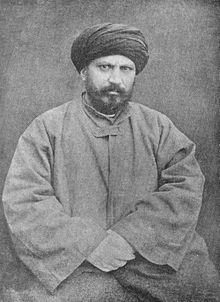
Back Jamal al-Din al-Afghani Afrikaans جمال الدين الأفغاني Arabic جمال الدين الافغانى ARZ Cəmaləddin Əfqani Azerbaijani جمالالدین افغانی AZB জামালুদ্দিন আফগানি Bengali/Bangla Jamal-ad-Din al-Afghaní Catalan جەمالەدینی ئەفغانی CKB Džamáluddín Afghání Czech Jamal al-Din al-Afghani Welsh
This article may contain an excessive number of citations. (January 2021) |
Jamal al-Din al-Afghani سید جمالالدین افغانی | |
|---|---|
 | |
| Personal life | |
| Born | Sayyid Jamaluddin ibn Safdar 1839 |
| Died | 9 March 1897 (aged 58) |
| Cause of death | Cancer of the jaw[3] |
| Resting place | Kabul, Afghanistan[3] |
| Nationality | Disputed[1][2][3] |
| Notable idea(s) | Pan-Islamism α, Sunni-Shia unity, against the British[4] |
| Religious life | |
| Religion | Islam |
| Creed | Disputed[1][2][3] |
| Movement | Modernism Pan-Islamism[5][6] Neo-Sufism[7] Islamism[8][9] |
| Muslim leader | |
Sayyid Jamāl al-Dīn al-Afghānī[11][12][13][14] (Pashto/Persian: سید جمالالدین افغانی), also known as Sayyid Jamāl ad-Dīn Asadābādī[15][16][17] (Persian: سید جمالالدین اسدآبادی) and commonly known as Al-Afghani (1838/1839 – 9 March 1897), was a political activist and Islamic ideologist who travelled throughout the Muslim world during the late 19th century. He is one of the founders of Islamic Modernism[14][18] as well as an advocate of Pan-Islamic unity in India against the British.[4][19] He has been described as having been less interested in minor differences in Islamic jurisprudence than he was in organizing a united response to Western pressure.[20][21] He is also known for his involvement with his follower Mirza Reza Kermani in the successful plot to assassinate Shah Naser-al-Din, whom Afghani considered to be making too many concessions to foreign powers, especially the British Empire.[22]
- ^ a b c Cite error: The named reference
OEPSTIwas invoked but never defined (see the help page). - ^ a b c Cite error: The named reference
EI2was invoked but never defined (see the help page). - ^ a b c d e Nikki R. Keddie, Nael Shama (2014). "Afghānī, Jamāl al-Dīn al-". In Oliver Leaman (ed.). The Oxford Encyclopedia of Islam and Politics. Oxford University Press. ISBN 9780199739356.
- ^ a b "AFḠĀNĪ, JAMĀL-AL-DĪN". Encyclopaedia Iranica. 22 July 2011.
- ^ Bentlage, Eggert, Martin Krämer, Reichmuth, Björn, Marion, Hans, Stefan (2017). Religious Dynamics under the Impact of Imperialism and Colonialism. Koninklijke Brill NV, Leiden, The Netherlands: Brill Publishers. p. 253. ISBN 978-90-04-32511-1.
{{cite book}}: CS1 maint: multiple names: authors list (link) - ^ Aydin, Cemil (2017). The idea of the Muslim world: A Global Intellectual History. United States of America: Harvard University Press. pp. 62, 231. ISBN 9780674050372.
- ^ Scharbrodt, Oliver (2007). "The Salafiyya and Sufsm: Muhammad 'Abduh and his Risalat al-Waridat (Treatise on Mystical Inspirations)". Bulletin of the School of Oriental and African Studies, University of London. 70 (1). Cambridge University Press: 89–115. doi:10.1017/S0041977X07000031. JSTOR 40378895. S2CID 170641656.
- ^ Sedgwick, Mark (2013). Muhammad Abduh: Makers of the Muslim World. One World. p. 56. ISBN 978-1851684328.
- ^ A. Dudoignon, Hisao, Yasushi, Stéphane, Komatsu, Kosugi; Gen, Kasuya (2017). "Chapter 3: THE MANARISTS AND MODERNISM". THE INFLUENCE OF AL-MANAR ON ISLAMISM IN TURKEY. Abingdon, Oxon: Routledge: Taylor & Francis Group. p. 56. ISBN 978-0-415-36835-3.
{{cite book}}: CS1 maint: multiple names: authors list (link) - ^ a b c d e Cite error: The named reference
Keddiewas invoked but never defined (see the help page). - ^ a b c d e f g N.R. Keddie (15 December 1983). "Afghan, Jamal-ad-Din". Encyclopædia Iranica. Retrieved 5 September 2010.
- ^ "Afghan, Jamal ad-Din al-". Oxford Centre for Islamic Studies. Oxford University Press. Archived from the original on 9 January 2014. Retrieved 5 September 2010.
- ^ "Jamāl ad-Dīn al-Afghān". Elie Kedourie. The Online Encyclopædia Britannica. Retrieved 5 September 2010.
- ^ a b "Jamal ad-Din al-Afghan". Jewish Virtual Library. Retrieved 5 September 2010.
- ^ Stéphane A. Dudoignon; Hisao Komatsu; Yasushi Kosugi (2006). Intellectuals in the Modern Islamic World: Transmission, Transformation, Communication. New horizons in Islamic studies. Taylor & Francis. p. 42. ISBN 0415368359.
- ^ Said Amir Arjomand (1988). Authority and Political Culture in Shi'ism. SUNY series in Near Eastern studies. SUNY Press. p. 120. ISBN 0887066380.
- ^ Ahmad Hasan Dani (2005). Chahryar Adle (ed.). History of Civilizations of Central Asia: Towards the contemporary period: from the mid-nineteenth to the end of the twentieth century. UNESCO. p. 465. ISBN 9231039857.
- ^ "Sayyid Jamal ad-Din Muhammad b. Safdar al-Afghan (1838–1897)". Saudi Aramco World. Center for Islam and Science. 2002. Archived from the original on 28 October 2019. Retrieved 5 September 2010.
- ^ Ludwig W. Adamec, Historical Dictionary of Islam (Lanham, Md.: Scarecrow Press, 2001), p. 32
- ^ The Encyclopaedia of Islam-V 2. E.J BRILL. p. 416. Retrieved 2 April 2020.
- ^ Vali Nasr, The Sunni Revival: How Conflicts within Islam Will Shape the Future (New York: Norton, 2006), p. 103.
- ^ Cite error: The named reference
:0was invoked but never defined (see the help page).